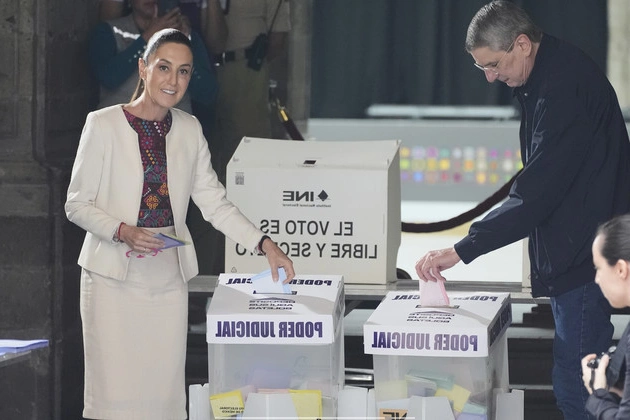
Mexico’s ruling Morena party is poised to take command of the Supreme Court, as early vote counts from the country’s inaugural judicial election suggest.
Although the final results for most of the 2,600 federal, state, and local judge positions contested in Sunday’s elections are pending, outcomes for the nine Supreme Court seats have been revealed.
Political Alignment in the Supreme Court
The majority of the newly elected justices exhibit close affiliations and ideological congruence with the ruling party, altering a previously balanced high court into the hands of the party responsible for the judicial system’s revamp to introduce judge elections.
Experts caution that this transition may undermine the checks and balances in the Latin American nation, with the governing party nearing control of all three branches of government. This consolidation could facilitate President Claudia Sheinbaum and her party in advancing their agenda more smoothly.
Diverse Judicial Landscape
Despite concerns over the concentration of power within a single party, officials dismiss democratic apprehensions. Many of the candidates with favorable prospects have ties to or backgrounds within the ruling party, either as former members or appointees of the previous administration.
However, not all new justices align explicitly with Morena. One notable exception is Hugo Aguilar Ortiz, an Indigenous advocate from Oaxaca. Despite lacking clear party affiliations, Aguilar Ortiz’s appointment resonates with Sheinbaum’s advocacy for Indigenous representation within the judiciary.
Reform Impact and Public Response
The judicial election follows a period of intense debate triggered by reforms spearheaded by former President Andrés Manuel López Obrador. These reforms mandated the election, rather than appointment, of judges, a move critics argue will diminish the Supreme Court’s role as a check on executive power.
While proponents assert that electing judges will curb corruption within a perceived flawed system, detractors question the motives behind the reforms. The election turnout of approximately 13% and voter confusion underscore the challenges posed by the new electoral process.
Future Implications
The absence of a counterbalance in the high court is likely to embolden Morena in pursuing further reforms, including alterations to Mexico’s electoral framework. These potential changes have sparked controversy and were previously impeded by judicial intervention.
Despite opposition claims of an unfair advantage, officials maintain that the election outcome does not signal a constitutional crisis. As the ballots near full tabulation, the repercussions of this judicial overhaul will undoubtedly shape Mexico’s political landscape.











